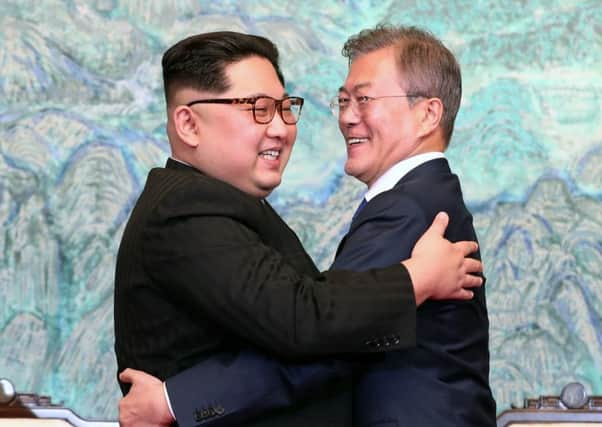Korean leaders agree to denuclearisation during historic talks


A joint statement issued by Kim Jong Un and Moon Jae-in after the summit said the two had confirmed their goal of achieving “a nuclear-free Korean peninsula through complete denuclearisation”.
The statement did not provide any new specific measures how to achieve the objective.
Advertisement
Hide AdAdvertisement
Hide AdNorth Korea has placed its nuclear weapons up for negotiations. It has previously used the term “denuclearisation” to say it can disarm only when the US withdraws its 28,500 troops in South Korea.
The two countries also said they will jointly push for talks with the US, and potentially China, to officially end the 1950-53 Korean War, which stopped with an armistice and left the Koreas still technically at war.
North Korean leader Mr Kim and South Korean President Moon announced after their summit that the Koreas will push for three-way talks including Washington or four-way talks that also include Beijing on converting the armistice into a peace treaty and establishing permanent peace on the Korean peninsula.
The Koreas said they hope the parties will be able to declare an official end to the war by the end of this year.
While President Donald Trump has given his “blessing” for the Koreas to discuss an end to the war, there can be no real solution without the involvement of Washington and other parties that fought in the war because South Korea was not a direct signatory to the armistice that stopped the fighting.
“I feel like I’m firing a flare at the starting line in the moment of (the two Koreas) writing a new history in North-South relations, peace and prosperity,” Mr Kim told Mr Moon as they sat at a table, built so that exactly 2018 millimetres separated them, to begin their closed-door talks.
Mr Moon responded that there were high expectations that they produce an agreement that will be a “big gift to the entire Korean nation and every peace-loving person in the world”.
Advertisement
Hide AdAdvertisement
Hide AdMr Kim acknowledged widespread scepticism over their summit: “We have reached big agreements before but were unable to fulfil them. There are sceptical views on whether the meeting today will yield meaningful results.
“If we maintain a firm will and proceed forward hand in hand, it will be impossible at least for things to get worse than they are now.”
The pair vowed to have more meetings, according to Mr Moon’s spokesman, Yoon Young-chan, with Mr Kim joking that he would make sure not to interrupt Mr Moon’s sleep any more, a reference to the North’s drumbeat of early-morning missile tests last year.
Mr Kim also referred to a South Korean island the North attacked with artillery in 2010, killing four, saying the residents of Yeonpyeong Island have high hopes the summit will help heal past scars.
Mr Kim said he would visit Seoul’s presidential Blue House if invited.
Earlier, both leaders smiled broadly as Mr Moon grasped Mr Kim’s hand and led him along a red carpet into South Korean territory, where schoolchildren gave Mr Kim flowers and an honour guard stood at attention for inspection, a military band playing traditional Korean folk songs.